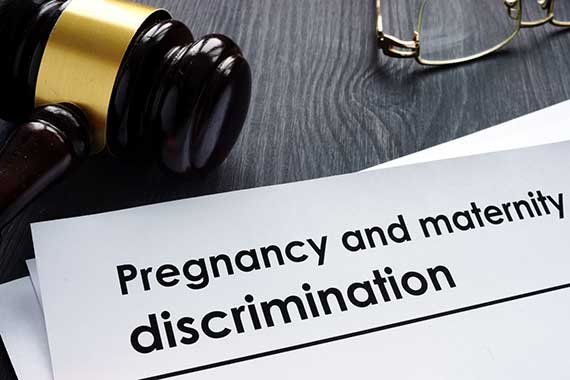If you feel like your pregnancy status is preventing you from getting hired, promoted, or has led to your termination, you have rights. The pregnancy discrimination lawyers at Jackson Spencer Law have many years of experience representing victims of workplace discrimination and a track record of obtaining significant settlements and awards for our clients.
Texas Pregnancy Discrimination Lawyer


If you feel like your pregnancy status is preventing you from getting hired, promoted, or has led to your termination, you have rights. The pregnancy discrimination lawyers at Jackson Spencer Law have many years of experience representing victims of workplace discrimination and a track record of obtaining significant settlements and awards for our clients.
What is Pregnancy Discrimination?
Pregnancy discrimination is when a person is treated unfairly at work because of pregnancy or medical concerns related to giving birth. Pregnancy discrimination is also illegal and can result in large settlements for victims. Unfortunately, pregnancy discrimination happens all the time to people across the country. Employers will sometimes even discriminate against people due to miscarriage, temporary or permanent pregnancy-related disability, or other related medical conditions.
What is Pregnancy Discrimination?
Pregnancy discrimination is when a person is treated unfairly at work because of pregnancy or medical concerns related to giving birth. Pregnancy discrimination is also illegal and can result in large settlements for victims. Unfortunately, pregnancy discrimination happens all the time to people across the country. Employers will sometimes even discriminate against people due to miscarriage, temporary or permanent pregnancy-related disability, or other related medical conditions.
Pregnancy Discrimination Laws
Pregnancy discrimination is prohibited under several federal laws, including:
- Title VII of the Civil Rights Act of 1964,
- The Pregnancy Discrimination Act (PDA), and
- The Americans with Disabilities Act (ADA).
These laws prohibit employers from discriminating against pregnant employees, recently pregnant employees, or those who have recently given birth. They also require employers to provide reasonable accommodations to pregnant employees as they would with any other employee who has a medical condition or disability.
Title VII of the Civil Rights Act of 1964 prohibits discrimination based on race, color, religion, sex, or national origin in all aspects of employment. This includes hiring and firing decisions, promotions, demotions, compensation packages, and benefits. The Pregnancy Discrimination Act (PDA) was passed in 1978 and amended Title VII to include discrimination based on pregnancy, childbirth, or related medical conditions.
The Americans with Disabilities Act (ADA) prohibits discrimination against employees who have disabilities that substantially limit one or more major life activities. This includes impairments such as those caused by pregnancy, even if those impairments will be reversed or may disappear after the pregnancy is over. Employers must provide reasonable accommodations for employees with disabilities, including those who are pregnant.
Pregnancy Discrimination Laws
Pregnancy discrimination is prohibited under several federal laws, including:
- Title VII of the Civil Rights Act of 1964,
- The Pregnancy Discrimination Act (PDA), and
- The Americans with Disabilities Act (ADA).
These laws prohibit employers from discriminating against pregnant employees, recently pregnant employees, or those who have recently given birth. They also require employers to provide reasonable accommodations to pregnant employees as they would with any other employee who has a medical condition or disability.
Title VII of the Civil Rights Act of 1964 prohibits discrimination based on race, color, religion, sex, or national origin in all aspects of employment. This includes hiring and firing decisions, promotions, demotions, compensation packages, and benefits. The Pregnancy Discrimination Act (PDA) was passed in 1978 and amended Title VII to include discrimination based on pregnancy, childbirth, or related medical conditions.
The Americans with Disabilities Act (ADA) prohibits discrimination against employees who have disabilities that substantially limit one or more major life activities. This includes impairments such as those caused by pregnancy, even if those impairments will be reversed or may disappear after the pregnancy is over. Employers must provide reasonable accommodations for employees with disabilities, including those who are pregnant.
Examples of Pregnancy Discrimination
The following are some signs that you may be experiencing pregnancy discrimination in your workplace:
- You were fired, demoted, or had your hours reduced after informing your employer of your pregnancy or after beginning to show your pregnancy.
- You were removed from projects or had clients taken away after you disclosed your pregnancy or began to show.
- You were treated differently than other employees who are not pregnant or have not recently given birth.
- You were asked unwelcome questions about your pregnancy, marital status, or plans for the future.
- You were denied benefits that other non-pregnant employees received.
- Your employer refused to let you return from maternity leave even though your doctor has cleared you to work.
- You were denied reasonable accommodation related to your pregnancy, such as time off to go to the doctor or special lifting or sitting restrictions or reasonable locations to breast feed.
- You were granted accommodation on paper or by HR, but your manager or supervisor is still forcing you to work against your doctor’s restrictions or threatening termination if you do not comply.
- You were denied employment at a new job after disclosing your pregnancy.
- You experienced retaliation in response to a formal complaint related to reporting pregnancy discrimination.
The following are some signs that you may be experiencing pregnancy discrimination in your workplace:
- You were fired, demoted, or had your hours reduced after informing your employer of your pregnancy or after beginning to show your pregnancy.
- You were removed from projects or had clients taken away after you disclosed your pregnancy or began to show.
- You were treated differently than other employees who are not pregnant or have not recently given birth.
- You were asked unwelcome questions about your pregnancy, marital status, or plans for the future.
- You were denied benefits that other non-pregnant employees received.
- Your employer refused to let you return from maternity leave even though your doctor has cleared you to work.
- You were denied reasonable accommodation related to your pregnancy, such as time off to go to the doctor or special lifting or sitting restrictions or reasonable locations to breast feed.
- You were granted accommodation on paper or by HR, but your manager or supervisor is still forcing you to work against your doctor’s restrictions or threatening termination if you do not comply.
- You were denied employment at a new job after disclosing your pregnancy.
- You experienced retaliation in response to a formal complaint related to reporting pregnancy discrimination.
What to Do If You’re the Victim of Pregnancy Discrimination
If you believe that you’ve been treated unfairly due to your pregnancy or a related medical condition, it’s important to take action immediately.
The first thing you should do is file an internal complaint with your employer and document everything, including but not limited to dates, time, place and the names of the parties involved. This can be done either verbally or in writing and will put them on notice of the problem.
Next, consult with an employment lawyer who can help you determine whether you have a case and guide you through the process. You may be entitled to financial compensation for any losses you’ve suffered, so it’s important to act quickly.
After, file a complaint with the Equal Opportunity Commission (EEOC). The EEOC will review your complaint and investigate based on sufficient evidence to support the claim. If the EEOC concludes their investigation and determines that pregnancy discrimination did take place, they will either sue the company themselves or issue a “Right to Sue” letter to you and your lawyer.
The pregnancy discrimination lawyers at Jackson Spencer Law can help workers recover lost wages, emotional distress damages, and other losses caused by the many forms of workplace discrimination, harassment, or retaliation.
What to Do If You’re the Victim of Pregnancy Discrimination
If you believe that you’ve been treated unfairly due to your pregnancy or a related medical condition, it’s important to take action immediately.
The first thing you should do is file an internal complaint with your employer and document everything, including but not limited to dates, time, place and the names of the parties involved. This can be done either verbally or in writing and will put them on notice of the problem.
Next, consult with an employment lawyer who can help you determine whether you have a case and guide you through the process. You may be entitled to financial compensation for any losses you’ve suffered, so it’s important to act quickly.
After, file a complaint with the Equal Opportunity Commission (EEOC). The EEOC will review your complaint and investigate based on sufficient evidence to support the claim. If the EEOC concludes their investigation and determines that pregnancy discrimination did take place, they will either sue the company themselves or issue a “Right to Sue” letter to you and your lawyer.
The pregnancy discrimination lawyers at Jackson Spencer Law can help workers recover lost wages, emotional distress damages, and other losses caused by the many forms of workplace discrimination, harassment, or retaliation.
Jackson Spencer Law’s Pregnancy Discrimination Lawyers Can Help
In many cases, victims do not report their experiences because they fear that no one will believe them or take them seriously. At Jackson Spencer Law, our experienced pregnancy discrimination attorneys will ensure your story is heard. If you are facing workplace pregnancy discrimination, we can inform you of your rights, determine if you have a valid claim, and help improve your chances of legal success.
We’re proud of what we’ve accomplished on behalf of our clients and thrilled when justice prevails. We’re committed to achieving justice for workers and we have many success stories of working with victims of workplace discrimination, including:
● Obtaining a $55,800 settlement for an employee who needed time off to care for their newborn child, and
● Securing a $218,099 settlement for a worker who was fired for taking FMLA leave to care for her newly adopted child.
No Guarantee of Results
The descriptions above are intended only to provide information about the activities and experience of our attorneys and are not intended to be a guarantee or assurance of future success in any matter. Each matter described was dependent upon unique facts and circumstances, which are not fully detailed on this website, and should not be relied on to predict the results of any current or future matter.
In many cases, victims do not report their experiences because they fear that no one will believe them or take them seriously. At Jackson Spencer Law, our experienced pregnancy discrimination attorneys will ensure your story is heard. If you are facing workplace pregnancy discrimination, we can inform you of your rights, determine if you have a valid claim, and help improve your chances of legal success.
We’re proud of what we’ve accomplished on behalf of our clients and thrilled when justice prevails. We’re committed to achieving justice for workers and we have many success stories of working with victims of workplace discrimination, including:
● Obtaining a $55,800 settlement for an employee who needed time off to care for their newborn child, and
● Securing a $218,099 settlement for a worker who was fired for taking FMLA leave to care for her newly adopted child.
No Guarantee of Results
The descriptions above are intended only to provide information about the activities and experience of our attorneys and are not intended to be a guarantee or assurance of future success in any matter. Each matter described was dependent upon unique facts and circumstances, which are not fully detailed on this website, and should not be relied on to predict the results of any current or future matter.



